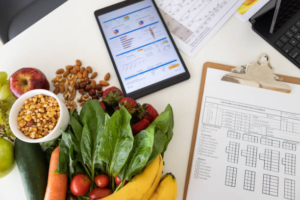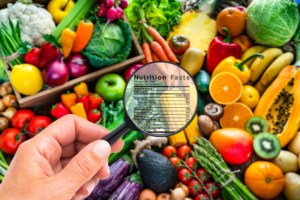The food system conversation has reached a bubbling boil in recent years. A food system includes all the steps in the food production, processing, distribution, consumption, and disposal chain. It’s a web of farmers, manufacturers, retailers, consumers, and waste management systems. Food systems study teaches us how food travels from farm to table and how the processes affect our environment, our health, and our economy. The WithGott readings are a great resource for understanding these systems and their many complexities.
What Are Food Systems?
When you hear the term “food systems,” it may sound like a buzzword, but the intricate web brings food from farm to fork. A food system includes all processes involved in feeding a population: growing, harvesting, processing, packaging, transporting, marketing, consuming, and disposing of food. It also encompasses the inputs needed and the outputs generated at every stage, such as labour, resources, and waste.
This concept is dissected in the context of food systems withgott readings. The readings emphasize that food systems are not just about agriculture but ecology, economy, culture, and society. They show how food systems are shaped by human behaviour and environmental limits. Food systems are like living organisms—complex, adaptive, and deeply tied to our daily lives and long-term survival.
Understanding food systems is crucial to addressing global challenges like hunger, climate change, and biodiversity loss. In today’s interconnected world, every choice made by a farmer, policymaker, or consumer has ripple effects throughout the system. That’s why diving deep into the Food Systems Withgott Readings offers a foundational perspective on how we feed the world—and at what cost.
Why Food Systems Matter in Today’s World
We often take food for granted. A quick trip to the grocery store, a meal at a restaurant, or even a food delivery app—these conveniences hide the vast machinery behind our meals. But with rising food prices, global hunger, soil degradation, and water scarcity, the cracks in our food systems are becoming hard to ignore.
The Food Systems Withgott Readings highlight the urgency of reforming how we produce and consume food. Our current systems rely heavily on fossil fuels, synthetic fertilizers, monoculture crops, and long-distance transportation. These practices may boost short-term yield but often undermine long-term sustainability. Withgott’s work underscores the trade-offs and unintended consequences baked into our modern food systems.
Moreover, food systems intersect with nearly every major global issue: economic inequality, health outcomes, environmental degradation, and social justice. This is why scholars, activists, and policymakers increasingly turn to resources like the Food Systems Withgott Readings to understand how to reshape these systems for the better.
The Importance of Studying Food Systems
The future of global sustainability hinges on food systems. Studying them will yield pathways to tackle some of the world’s most urgent challenges, including food security, climate change, and public health. For example, a food system that tightly depends on monoculture farming cannot only harm biodiversity but also soil degradation. A sustainable food system, however, values biodiversity, environmental sustainability, and workplace equity.
In the withGott readings, the knowledge that is needed to analyze these systems critically is given to us. This addresses the science of ag practices, food distribution networks, nutrition, and the impacts of policy decisions on food security.
The Role of Agriculture in Food Systems
Agriculture is the foundation of every food system. And it is the first step in the food-producing process. Without farms, there would be nothing to distribute or eat. But agriculture in the modern world has a lot of impact on the environment. From pesticide use to deforestation, agriculture has the potential to drive climate change and other damage to the environment. Therefore, it is important to study practices of sustainable agriculture because that way we can have enough food to feed all without causing damage to the environment.
With Gott readings, scholars and policymakers are able to assess the pros and cons of different agricultural systems. Many of these readings have to do with organic farming, agroecology, and regenerative practices — and ways in which we can develop more sustainable food systems.
The Food Processing and Distribution Stages
After food has been harvested, it can go through the processing and distribution stages. This step is to evolve raw materials into end products with edible components. Processing typically involves washing, packaging, and sometimes cooking. Then the food goes out to wholesalers, retailers, and supermarkets and, finally, end consumers.
But this part of the food system can be energy-intensive. Processing and distribution take vast amounts of energy, packaging, and transport. These types of practices inflate our food’s carbon footprint and add to environmental pollution.
The WithGott readings support further understanding these stages impact on food sustainability. They emphasize the environmental footprint of packaging materials and investigate ways in which food distribution can be made more efficient. Studying various food systems enables scholars to identify system-scale strategies to minimize waste and carbon emissions during processing and distribution.
Food Consumption Patterns and Health
Food systems are also critical in influencing consumption. What we eat directly affects our health as well as the health of the environment. A diet consisting of processed foods rich in sugars, salt, and unhealthy fats can result in chronic diseases including obesity, diabetes, and heart disease. Conversely, a diet high in whole plant foods and lean meats is linked to more favorable health outcomes.
The WithGott readings provide important insight about how food systems are impacting nutrition and health. They tend to tackle problems such as food deserts (and limited access to healthy food), food insecurity, and the effect of dietary decisions on public health. Recognizing these relationships empowers us to create healthier food systems that benefit not just individuals but also entire communities.
The Environmental Impact of Food Systems
Perhaps the most pressing issue concerning food systems is their impact on the environment. The agriculture sector also doesn’t nudge horsy-government green plans, as it is a big source of greenhouse gas emissions, deforestation, and water pollution. A recent study found that livestock production emits about 14% of worldwide methane emissions. Moreover, it is another consumption of resources and carbon emissions from food.
These environmental problems and solutions are better understood by reading the Withgott readings. Lots of these books also center around sustainable food practices things like minimizing food waste, using more sustainable farming methods, promoting plant-based eating, etc. Sustainable Food Systems to Mitigate Climate Change and Conserve Future Generations Natural Resources
Policy and Governance in Food Systems
Policies and governance interact at local and global levels to shape food systems. Everything from the standards for food safety to the subsidies for agricultural products is defined by government regulations. If done effectively, recalibrating these policies will have a dramatic influence on the cost and accessibility of food and the sustainability of our food system.
The WithGott readings often explore the role of policy in shaping food systems. They examine how laws and regulations can support — or obstruct — the development of sustainable, equitable, resilient food systems. Analysis of case studies and policy analyses allows researchers to discover solutions and best practices in generating food policies that are aimed towards health, sustainability, and social equity.
The Future of Food Systems
Food systems need to adjust to a growing population. This calls for creative solutions, from state-of-the-art agricultural technologies to new food distribution models. Food systems of the future will necessarily need to share a focus on sustainability, efficiency, and equity.
To help explore these trends of the future, we have the withGott readings. They point to new technologies like vertical farming, lab-grown meat, and plant-based food innovations. These new developments can be assessed and analyzed to influence the future of food systems for the greater good, improving nutritional equity for all.
In contrast, modern food systems—especially in the industrialized world—are centralized, mechanized, and globalized. The Food Systems Withgott Readings explore this transition in detail, pointing out how the drive for efficiency and profit has led to monocultures, heavy pesticide use, and dependency on fossil fuels.
Conclusion
Food systems are intricate, interdependent networks that affect everything from health and nutrition to the environment and economy. Gott readings give us important insight into these systems and the many ways they can be examined. Food systems have a focus, and by analyzing and investigating them, we see opportunities for improvement, which sets us on a path towards sustainable, equitable, and resilient food systems in the future.
With climate change, food insecurity, and issues that can make people sick, we should be studying and improving our food systems. The withGott readings are absolutely critical in this work; they provide everything we need to build a better food system, and they provide us with the tools to thrive as a collective.




